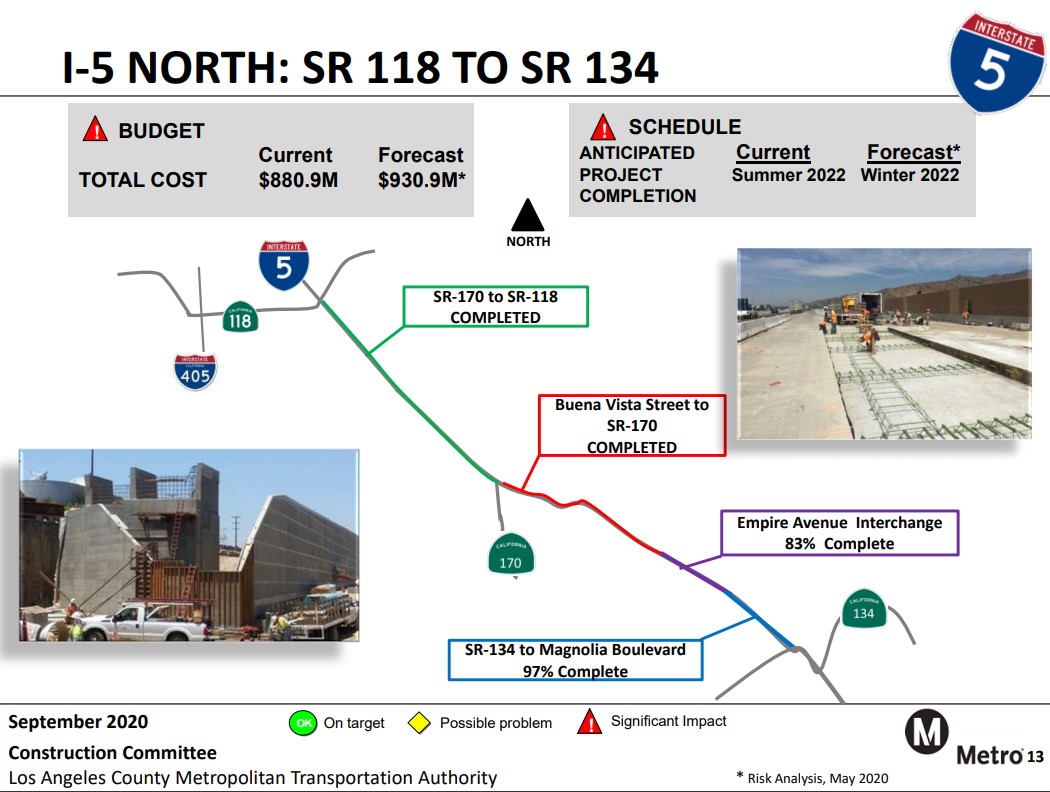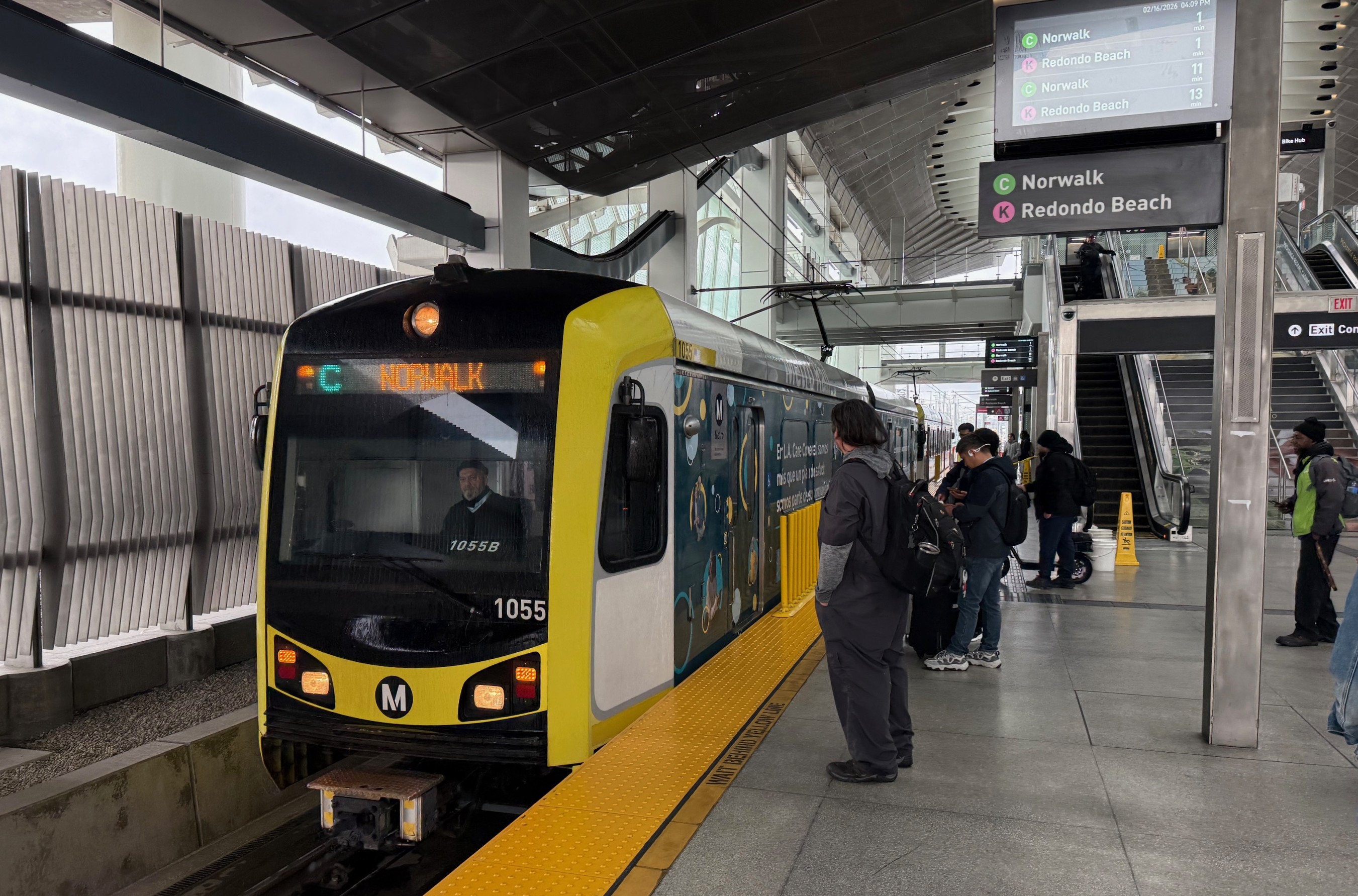
Caltrans and Metro are at odds over how to pay for ballooning cost overruns on their joint project to widen the 5 Freeway through the San Fernando Valley. The I-5 North Corridor Improvements project extends twelve miles from the 134 Freeway in Glendale to the 118 Freeway in Mission Hills.
(Note that the "North" in the project title does not refer to northbound traffic, but distinguishes the project from Caltrans and Metro's $1.9 billion seven-mile I-5 South Corridor widening between the 605 Freeway and Orange County.)
Caltrans and Metro's 5 Freeway North widening mega-project is difficult to get one's head around, as the project is broken up into at least six sub-projects, each with its own budget and timeline.
5 Freeway North construction got underway in 2010, and was due to be completed in 2017. The northern portions - between the 170 Freeway and the 118 Freeway - are already done.
The current more-or-less last construction phase through Burbank - called the I-5 Empire Project for Burbank's Empire Boulevard - broke ground in 2014. In 2013, Burbank construction was anticipated to take about three and a half years, with completion expected in 2017. By the May 2014 groundbreaking, Caltrans District 7 Director Carrie Bowen announced that it would take "about five years."
At the project's 5th annual community meeting in 2018, Caltrans project manager John Yang stated, "We’re targeting a completion date of December 2020." In 2019, Caltrans blamed further delays on 2018-19 rains. Completion is now tentatively anticipated in Winter 2022 (per this month's Metro project status report - page 13.) The three-to-four years-long Burbank I-5 widening is now anticipated to take eight and a half years to build, so it's about five years behind schedule.
The project is also well over its initial $1.3 billion budget. Metro's latest status report shows a $50 million cost overrun, but that appears to represent only a portion of the total cost overage (and overruns could continue to increase as the schedule continues to lengthen.) There appear to be cost overruns on segments in both Burbank and Glendale, and maybe others. When Metro boardmembers asked in 2019, Caltrans officials declined to state a projected total cost. At last night's 7th annual community meeting, Yang responded to a cost question saying he "will let you know at the very end" of project construction.
Metro's Chief Program Management Officer Richard Clarke has been sounding the alarm on I-5 North project cost overruns to the Metro board since mid-2019. Metro's board Construction Committee is increasingly voicing concerns that Metro could get stuck paying for overrun costs. Yesterday, when Clarke again said the project would need a "budget adjustment," committee chair Supervisor Janice Hahn stated that Metro had no obligation to pay for the project's cost overruns, and that she was not comfortable with Metro paying more money for this. Supervisor Kathryn Barger called the 5 Freeway widening project a "nightmare" and "an example of how not to do things."
Metro CEO Phil Washington echoed Hahn, noting that, in June, he had submitted a formal letter to Caltrans District 7's current Director John Bulinski stating that "the funding agreement for this [I-5 North] project indicates that Metro does not have financial responsibility for cost overruns" and further noting that, under current sales tax revenue shortfalls, other sources of Metro funding were committed and could not be used for the 5 Freeway North, as this would defund other projects. (Metro provided the letter to Streetsblog, but redacted the cost overrun dollar amount.)
One of the problems with Metro and Caltrans' mega-costly highway widening mega-projects is that the on-the-ground situation is changing too fast for these battleships to turn around. The I-5 North improvements started construction a decade ago. Not that highway widening was ever an unmitigated good, but the last decade has seen some realignment of policies at the state level, where new metrics are attempting to align planning with urgent climate goals. Like zombies, these highway projects continue to rear their ugly heads over and over. This zombie engineering is not just happening at Caltrans, but at many levels of government, including Metro and Los Angeles City.
At last night's meeting, Caltrans' Yang seemed to acknowledge some of the new priorities. Yang sounds truly tired of the slog of this problem-plagued project that, by 2018, he had already described as having "overstayed its welcome in Burbank." Though Yang touted Caltrans' plan to keep widening the 5 Freeway in southeast L.A. County - from the 605 Freeway to the 710 Freeway - he alluded to the broader futility of continuing to expand freeways. When asked about future freeway expansion, he stated, "If you build ten lanes in each direction, they will all be filled." He noted that a "new generation" is talking about "climate change" and that COVID-19 had shown possibilities for telework and other ways to manage demand. He acknowledged that Caltrans is moving from "measuring congestion" (called Level of Service) to "vehicle miles traveled." That transition was already mandated by state law, though Metro and Caltrans are still lagging way behind the new changes. Yang stated that Caltrans is facing a future that "limit[s] freeway expansion."
The "nightmare" of 5 Freeway widening won't end when its construction and funding woes wind down. When the wider freeway opens, more tailpipe emissions and increased car traffic will further choke Burbank, the region, and indeed the globe.
Caltrans and Metro have long claimed that widening the 5 Freeway will have benefits that no past freeway project has ever delivered. The project website still asserts the highway builders' tired false claims that it will "reduce congestion, ...decrease surface street traffic and improve air quality." These lies get repeated in Caltrans press releases.
But, at a time when global warming is burning record acreage throughout the state, Caltrans and Metro really need to press pause on wrongheaded freeway construction. Perhaps this will be part of California Governor Gavin Newsom's fast-track climate efforts and Los Angeles Mayor Eric Garcetti's decade of action for the climate. Don't hold your smoke-polluted breath.







